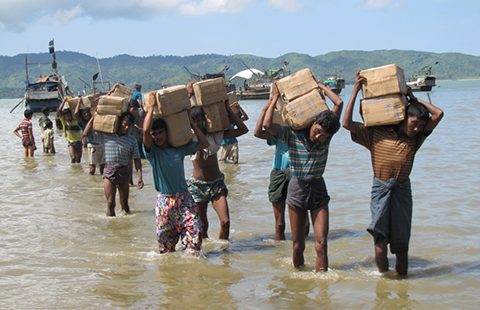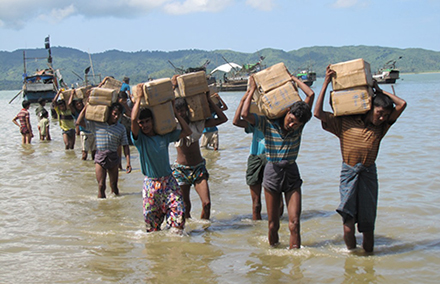Is a regional solution for the Rohingya outflow really unachievable?
The 29 May Bangkok Special Meeting on Irregular Migration in the Indian Ocean was widely seen as a failure.
This is because it did not produce a substantial set of agree actions for coordinated ongoing implementation by attending countries, and by the Rohingya “frontline states in particular. Yet the special meeting was not a complete failure; indeed it was seen by some of those attending, such as the International Organization for Migration, as a worthwhile “first step”. It would be a great pity if efforts to deal with this “crisis” ignored the efforts invested in tackling the complex issues which were probably never capable of being resolved in a single meeting without some extraordinary leadership, not present on this occasion.
Attendance at the meeting by 17 regional governments and relevant international agencies, for example, clearly signalled the level of regional interest/concern. All ASEAN members except small peripheral countries, Brunei and Timor Leste, were present, but the ASEAN Secretariat was apparently not in attendance. All major South Asian countries attended. China was the notable absentee, no coincidence given the “Indian Ocean” headline title of the Special Meeting. Whether China’s absence made a difference is not clear. Australia was not the only country not represented at ministerial level, but was evidently the only regional country to not send a minister.
Despite the self-satisfied tone of their joint media release, “Helping the region to address irregular migration” written and apparently issued before the meeting concluded, it gives some hope that further engagement on the issue by Australia could be expected, even though Foreign Minister Julie Bishop and Immigration Minister Peter Dutton committed a very modest additional $5 million to support regional efforts to “address this regional challenge”.
Unfortunately, the Australian government’s subsequent public silence on the Thai Government’s Special Meeting, could be interpreted as indicating that the Coalition has little confidence in concrete, if imperfect, attempts to find a regional solution to the “crisis”. This suggests that no amount of desperate deliberations on possible “solutions” by 17 countries plus relevant international agencies could change Prime Minister Tony Abbott’s “nope, nope, nope” rebuff to resettling Rohingya in Australia (uttered as much as eight days earlier).
A sobering note, in terms of possible future actions, was the first-ever formal statement by Myanmar’s National League for Democracy (NLD) after the meeting on 2 June 2015 that “resolution of the communal conflict in Rakhine State should be founded on the principles of human rights, democracy and rule of law”, but expeditiously and transparently. While consistent with the position long adopted by Aung San Suu Kyi, this statement was out of touch with the expectations of the activist community and international media, and was not widely reported abroad.
While the NLD statement – like statements by the Myanmar Government – still glaringly avoids using the terms “Rohingya”, and merely calls for the citizenship issue to be addressed “fairly, transparently, and as quickly as possible”, it at least highlights correctly that further action by Myanmar in this area is essential and urgent. Indeed, there is much for Myanmar to do to facilitate dealing with legitimate citizenship claims by Rohingya, and restoring any rights removed (either deliberately or inadvertently) in recent Myanmar Government policy reversals. This not is a case of pointing a finger unreasonably and solely at Myanmar.
Not all international media accounts suggest the meeting was a failure, or that it failed to address the issue. Quite the reverse. Not surprisingly, perhaps, statements issued after the meeting by the key international agencies, such as the UNHCR and IOM, were also not nearly so negative. Certainly no agreement was achieved at the Special Meeting on more important practical steps urgently needed, and delicate trade-offs on improved handling of the regional boat people crisis were apparently not struck. However, the Thai Government’s “summary” of the meeting covers many sensitive issues including encouraging “safe and legal migration for work”, where participating counties such as Thailand, Malaysia and Indonesia must lift their performance and their observance of international and domestic laws. The summary includes many administrative and procedural measures necessary for improving practical humanitarian responses to the crisis all round.
Ultimately, it is not up to the international community to impose solutions on any of the countries on the Rohingya “frontline” – Myanmar, Bangladesh, Thailand, Malaysia, and Indonesia. But existing international norms have a legitimate place in progressing towards better arrangements that are in the interests of all, including the wider international community which is naturally concerned about the situation of the Rohingya. For example, the frontline states should also observe relevant international norms if they expect “outside” assistance in meeting the basic needs of people flows of all kind.
This includes taking effective action against any internal criminal activity or breaches of domestic or international laws. But it also includes frontline states doing much more to protect the normal rights of peoples like the Rohingya, including equitable and expeditious access to citizenship, health and education, and where relevant, employment. If such practical steps such as improved sharing of intelligence and other information could be agreed on through further negotiations, the more egregious incidents of death, cruelty, mistreatment and abuse that we have seen recently might be avoided.
However, better respect for international norms relevant to these problems is sorely needed. Inputs of financial, technical and humanitarian support from other members of the international community such as Australia might be essential to build the necessary enabling environment, and to ensure more effective specialist involvement of agencies such as the UNHCR and the IOM in holding and screening such boat people. This has been done in Southeast Asia before when it was possible to build a relatively orderly and humane program of movement. Reasonable access to resettlement or properly structured employment in neighbouring countries should also form an integral part of this regional package.
With a sizeable and well-behaved Rohingya of its own already, Australia cannot stand aside from these efforts, and should not expect that an arms-length attitude will be sufficient. Rather, more engagement by Australia and others could help the region move forward through more effective and humane collective collaboration.
Trevor Wilson is a visiting fellow at the Coral Bell School of Asia Pacific Affairs, The Australian National University and former ambassador to Myanmar.
 Facebook
Facebook  Twitter
Twitter  Soundcloud
Soundcloud  Youtube
Youtube  Rss
Rss 
